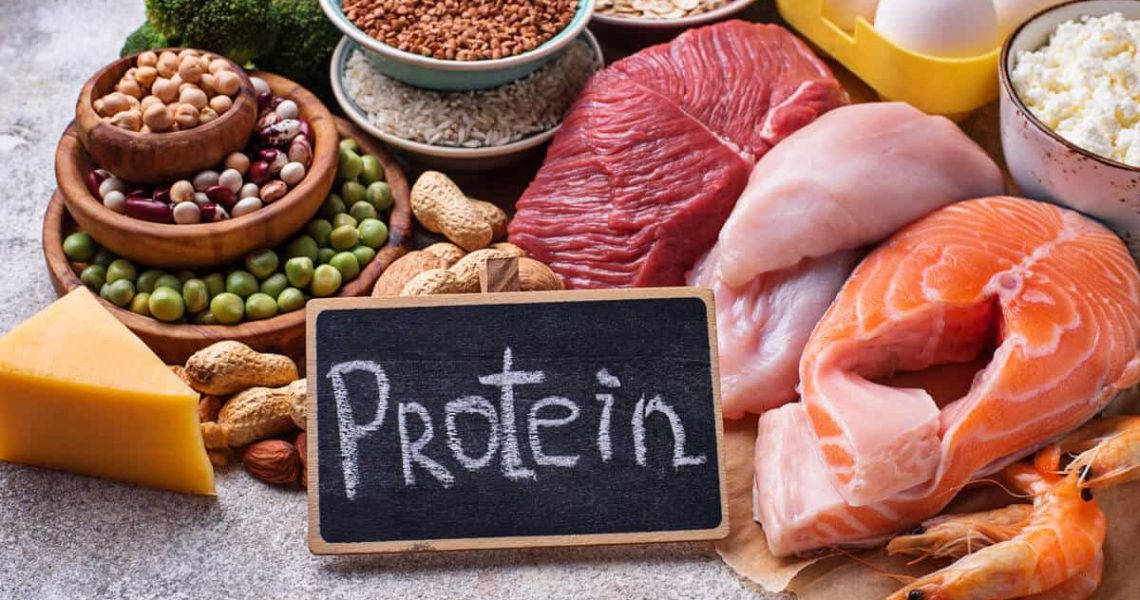Do CrossFit/ weightlifting/ endurance athletes need more protein than the average person?
Yes, these athletes need more protein than their sedentary friends. Protein can improve recovery from training and help decrease soreness and inflammation resulting from the breakdown of muscle tissue. Also, adding protein to your post-exercise carbohydrate-rich meal may improve your body’s ability to refuel your muscles with glycogen (the storage form of carbohydrate in your body).
Will a high protein diet help with weight loss?
Eating 20 to 30 grams of protein per meal may help with weight loss by enhancing feelings of fullness and preserving muscle mass while you are losing weight (so you lose more fat and less muscle tissue). Initially, a higher protein diet may facilitate greater weight loss than a high carbohydrate diet. However, reduced-calorie diets with a wide intake range of fat, carbohydrate, and protein can promote weight loss. The optimal diet is the one that’s tailored to your personal preferences and lifestyle.
How much should be consumed per meal to maximise muscle growth/repair?
The total amount and quality of protein you consume at each meal matters because we build and repair muscle throughout the day, not in one sitting. Healthy, young adults should aim for approximately 20 grams of high-quality protein at each meal and after resistance training. Older adults need about 30 grams of protein per meal and up to 40 grams after resistance training to maximally stimulate muscle protein synthesis (these are lower end estimates, as individual protein needs are down to body weight).
Are protein requirements the same throughout your life?
As we age, we gradually lose muscle mass, a process called sarcopenia, which starts at about 40 years old. However, resistance exercise (such as lifting weights) and a sound diet, which includes slightly more protein than the RDA, can help minimize the loss of both muscle mass and strength. As we age, our protein needs increase because older individuals require higher doses of protein to stimulate muscle protein synthesis. (Exercise can help reverse Sarcopenia. The strongest way to fight sarcopenia is to keep your muscles active. Combinations of aerobic exercise, resistance training and core training can prevent and even reverse muscle loss.)
Will consuming whey-based protein lead to weight gain?
Yes, it could—but only in the way that eating chicken and even salad can eventually lead to weight gain. Too much of anything can boost your calorie intake and lead to a larger number on the scale, so don’t let the rumours scare you away from whey. According to a study in the Journal of the American College of Nutrition, using it to replace calories in your daily diet can lead to a bodyweight decrease, while weight training on top of that can lead to a lean body muscle increase. So feel free to ignore the myths, as long as you aren’t consuming it in a calorie surplus.
Is it true that you can’t digest more than 30g at a time and how much protein bad for your kidneys?
There is a myth that protein can be bad for your kidneys and you can only absorb 20-30 grams of protein per meal while the rest is excreted in urine! Do you think we would be here today if our bodies could only use 30 grams of protein per meal? The simple truth is that more protein just takes a longer time to digest and be utilised. Digestion of a standard meal is still incomplete after five hours, and amino acids are still being released into your bloodstream and absorbed into your muscles. Eat away ![]()
![]()
![]()
![]()
![]()
![]() ! This is an overly simplified view of how the body works. Consuming more protein is not “wasted”, it just takes longer to digest. More recent evidence also suggests no adverse effects of high protein intakes in healthy, resistance training individuals (Antonio et al. 2016). In subjects consuming ~3.3 g/kg/d of protein for ~6 months, no negative effects on kidney function were found. Bear in mind, that intake is 4 times the RDA for protein, yet still, no issues were noted. All in all, the literature does not support the idea that high protein intakes (>3 g/kg/d) pose any risk to the health of one’s kidneys. FYI – There are different kinds of protein powders that have different effects and purposes. Whey is fast absorbing so it is suggested to consume post or intra-workout. Casein is slow absorbing and suggested to consume midday or closer to bed-time. Neither is better or worse than the other.
! This is an overly simplified view of how the body works. Consuming more protein is not “wasted”, it just takes longer to digest. More recent evidence also suggests no adverse effects of high protein intakes in healthy, resistance training individuals (Antonio et al. 2016). In subjects consuming ~3.3 g/kg/d of protein for ~6 months, no negative effects on kidney function were found. Bear in mind, that intake is 4 times the RDA for protein, yet still, no issues were noted. All in all, the literature does not support the idea that high protein intakes (>3 g/kg/d) pose any risk to the health of one’s kidneys. FYI – There are different kinds of protein powders that have different effects and purposes. Whey is fast absorbing so it is suggested to consume post or intra-workout. Casein is slow absorbing and suggested to consume midday or closer to bed-time. Neither is better or worse than the other.
Are protein shakes magical and will they help all my training needs?!
Unfortunately there is nothing magical about consuming protein powder, it’s just a convenient protein source! However, protein shakes are not for everyone. Whey and casein are derived from milk proteins, so if you’re lactose intolerant or have a sensitivity to dairy products (or tend to feel bloated or gassy), try a different brand or other protein powders such as pea, beef, hemp, soy, rice, or egg.
Who should use protein powder?
Anyone can consume protein powder, there’s no reason to suggest they shouldn’t. However, if you were to rephrase the question slightly to “who would benefit most from consuming protein powder?” then the best candidates would be people who would find it easier to consume an appropriate amount of protein via supplementation. One particular sub-group that I would highlight is the elderly population. The elderly suffer from a now well-established phenomenon known as “anabolic resistance”, a blunted response to an anabolic stimulus (resistance exercise and/or amino acid feeding. For example, if a young individual consumes a 20 gram dose of high quality protein, this maximises the muscle protein synthetic (building) response to feeding. However, the same dose provided to an elderly person will not lead to maximal stimulation of muscle protein synthesis, higher protein doses are necessary in this context. In addition, elderly people often have a skewed distribution of their daily protein intake, with low amounts consumed at breakfast and lunch, with the majority of their daily protein intake consumed at dinner. This is sub-optimal for the support of skeletal muscle health and function. Therefore it would be a good practice to supplement these lower protein meals with a protein supplement, a practice which is supported by the scientific literature (Norton et al. 2016).
Do I always have to have a protein shake post workout?
No. Food will absolutely do the job. However, given the convenience of consuming a protein shake post-workout this may be an appealing alternative to whole food for some people. But both are perfectly fine.
Does heating or cooking protein powder damage it?
NO. The protein doesn’t get ‘damaged’; our bodies absorb the exact same amino acids from the protein whether we cook it or not.
Do CrossFit/ weightlifting/ endurance athletes need more protein than the average person?
Yes, these athletes need more protein than their sedentary friends. Protein can improve recovery from training and help decrease soreness and inflammation resulting from the breakdown of muscle tissue. Also, adding protein to your post-exercise carbohydrate-rich meal may improve your body’s ability to refuel your muscles with glycogen (the storage form of carbohydrate in your body).
Too much protein, no whey mate!!


